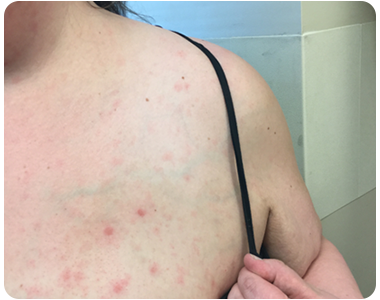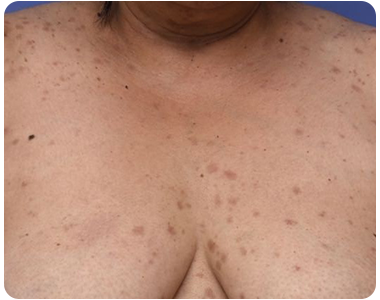CONGENITAL SYPHILIS IS ON THE RISE.
Syphilis is a sexually transmitted disease (STD) caused by the bacteria Treponema pallidum. Congenital Syphilis occurs when a pregnant woman transmits syphilis to their unborn baby, and new infections are rising; from 11 diagnosed cases in 2021 to 22 cases in 2023. This is a 100% increase.
More Facts – Public Health-Seattle & King County
GET TESTED. GET CURED.
WHAT ARE THE SYMPTOMS?
Symptoms of syphilis can be easy to miss or mistake for something else. Even if you don’t notice symptoms, or if the symptoms go away on their own, you can still have syphilis. Regular STD testing can help catch syphilis before it gets too serious.
Different stages, different symptoms. Syphilis goes through four stages if left untreated. Regular testing for STDs can help catch syphilis early. However, it’s important to be aware of what each stage looks like so you can seek treatment.
Primary Syphilis
The first stage is called primary syphilis. It occurs 10-90 days after infection. In this stage people develop a painless sore (called a chancre) where the bacteria that causes syphilis enters the skin. This could be on the vulva, vagina, mouth, lips, tongue, anus, rectum, and penis. The sore goes away on its own without treatment. As a result, many people don’t notice this stage. But don’t ignore the sore! Even if it goes away, syphilis is still in your body. Be sure to get treated as soon as you notice it!
Secondary Syphilis
The second stage is called secondary syphilis. It occurs several weeks after when the sore of primary syphilis is healing. In this stage people can get a reddish-brown, spotted rash on the palms of the hands or bottoms of the feet. Additionally, the rash can appear on the chest, stomach, back, arms, and legs. People with secondary syphilis may also develop white spots in their mouths, patchy bald spots, and/or fleshy bumps that occur in the skin folds. Some people have flu-like symptoms like fever, fatigue, aches, and swollen glands. Even without treatment, secondary syphilis will also resolve on its own.
Latent Syphilis
No symptoms: After secondary syphilis, the infection enters the latent stage where there are no symptoms. Although there are no symptoms, you will remain infected if you don’t get cured.
Tertiary (Late) Syphilis
Finally, after two to three decades, syphilis enters the tertiary stage. Most people do not experience tertiary syphilis. If it does occur, it will severely affect organ function. It is important to know that syphilis can also affect the eyes, ears, and brain at any stage, especially early syphilis.
GET TESTED.
If you’re sexually active, make syphilis testing part of your routine just like testing for HIV and other STDs.
Where can I get prenatal care and tested for syphilis?
Public Health offers First Steps which is a two-part program that provides prenatal care and testing at these locations. Cost varies.
Seattle / Shoreline / Skyway
| Prenatal Care Sites | Phone Number |
|---|---|
| Aurora Clinic | (206) 715-5793 |
| Columbia City at Neighborcare | (206) 296-4650 |
| High Point at Neighborcare | (206) 461-6950 |
| SHE Clinic | (206) 702-8460 |
| Carolyn Downs Family Medical Center | (206) 299-1900 |
| Harm Reduction Doulas | N/A |
| Seattle Indian Health Board | (206) 324-9360 |
| Swedish OB Outreach Clinic | (206) 320-2484 |
South King County
| Prenatal Care Sites | Phone Number |
|---|---|
| HealthPoint (Auburn) | (206) 263-2460 |
| HealthPoint (Des Moines) | (206) 870-3588 |
| HealthPoint (Kent) | (206) 263-2460 |
| HealthPoint (SeaTac) | (206) 477-1870 |
| Muckleshoot Indian Tribe Health and Wellness Center | (253) 939-2131 |
| Multicare OB/GYN | (253) 403-1000 |
| SeaMar Community Health Centers | (206) 762-3730 |
East King County
| Prenatal Care Sites | Phone Number |
|---|---|
| Eastgate Public Health Center | (206) 477-8000 |
| HealthPoint (Bothell) | (425) 486-0658 |
| Totem Lake- Allegro Pediatrics | (425) 814-5170 |
| Overlake OB/GYN | (425) 688-5000 |
GET CURED.

There is a cure for syphilis, and congenital syphilis is preventable. The sooner you get treated, the easier it is to cure. Delaying treatment can lead to serious health conditions for you and your baby. If you’re pregnant, get tested and treated for syphilis immediately.
If you have syphilis avoid having sex until you are cured. Tell your sex partners so they can also get tested and cured. Do not have sex with a partner who has syphilis until they are cured.
Can I get syphilis again after I’ve been cured?
Yes. Having syphilis once does not protect you from getting it again. If your partners have not been cured, they can re-infect you.










































